
- Subject:
- Political Science
- Social Science
- Material Type:
- Unit of Study
- Provider:
- Rice University
- Provider Set:
- OpenStax College

Anthropology, Archaeology, Cultural Geography, Economics, Ethnic Studies, Linguistics, Political Science, Psychology, Social Work, Sociology and Women's Studies.

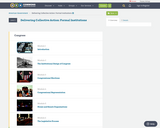



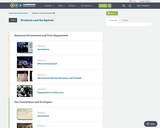

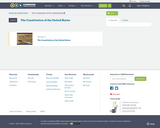
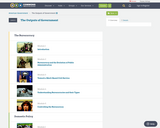
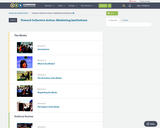
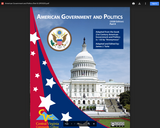
Originally published as American Government and Politics in the Information Age in 2011 as CC BY-NC-SA.
Updated by James J. Tuite in 2020. This is a textbook for the first part of an introductory course on the American political process. Teaches the structure, operation, and process of national, state, and local governments.
Video lectures are available at: https://www.youtube.com/playlist?list=PLCInj8bmD5BUa9UnNrtAblznm6skFNZJh
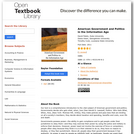
This text is a comprehensive introduction to the vital subject of American government and politics. Governments decide who gets what, when, how (See Harold D. Lasswell, Politics: Who Gets What, When, How, [New York: McGraw-Hill, 1936]); they make policies and pass laws that are binding on all a society’s members; they decide about taxation and spending, benefits and costs, even life and death.Governments possess power—the ability to gain compliance and to get people under their jurisdiction to obey them—and they may exercise their power by using the police and military to enforce their decisions. However, power need not involve the exercise of force or compulsion; people often obey because they think it is in their interest to do so, they have no reason to disobey, or they fear punishment. Above all, people obey their government because it has authority; its power is seen by people as rightfully held, as legitimate. People can grant their government legitimacy because they have been socialized to do so; because there are processes, such as elections, that enable them to choose and change their rulers; and because they believe that their governing institutions operate justly.Politics is the process by which leaders are selected and policy decisions are made and executed. It involves people and groups, both inside and outside of government, engaged in deliberation and debate, disagreement and conflict, cooperation and consensus, and power struggles.In covering American government and politics, this text introduces the intricacies of the Constitution, the complexities of federalism, the meanings of civil liberties, and the conflicts over civil rights;explains how people are socialized to politics, acquire and express opinions, and participate in political life; describes interest groups, political parties, and elections—the intermediaries that link people to government and politics; details the branches of government and how they operate; and shows how policies are made and affect people’s lives.
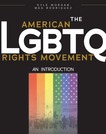
The American LGBTQ Rights Movement: An Introduction is a peer-reviewed chronological survey of the LGBTQ fight for equal rights from the turn of the 20th century to the early 21st century. Illustrated with historical photographs, the book beautifully reveals the heroic people and key events that shaped the American LGBTQ rights movement. The book includes personal narratives to capture the lived experience from each era, as well as details of essential organizations, texts, and court cases that defined LGBTQ activism and advocacy.

This book provides an introduction to the study of meaning in human language, from a linguistic perspective. It covers a fairly broad range of topics, including lexical semantics, compositional semantics, and pragmatics. The chapters are organized into six units: (1) Foundational concepts; (2) Word meanings; (3) Implicature (including indirect speech acts); (4) Compositional semantics; (5) Modals, conditionals, and causation; (6) Tense & aspect.
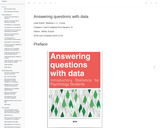
This is a free textbook teaching introductory statistics for undergraduates in Psychology. This textbook is part of a larger OER course package for teaching undergraduate statistics in Psychology, including this textbook, a lab manual, and a course website. All of the materials are free and copiable, with source code maintained in Github repositories.
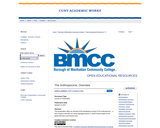
This presentation offers an overview of the developing concept of The Anthropocene -- a term coined to describe our current geological epoch, in which human impact on the planet will leave a permanent trace.

Assignment and discussion prompts for 100-level anthropology courses. Scoring criteria are included.

This course applies the tools of anthropology to examine biology in the age of genomics, biotechnological enterprise, biodiversity conservation, pharmaceutical bioprospecting, and synthetic biology. It examines such social concerns such as bioterrorism, genetic modification, and cloning. It offers an anthropological inquiry into how the substances and explanations of biology—ecological, organismic, cellular, molecular, genetic, informatic—are changing. It examines such artifacts as cell lines, biodiversity databases, and artificial life models, and using primary sources in biology, social studies of the life sciences, and literary and cinematic materials, and asks how we might answer Erwin Schrodinger’s 1944 question, “What Is Life?” today.
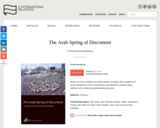
Written as events unfolded, this edited collection of articles offers insightful and diverse perspectives on the Arab uprising, and expands to consider related political unrest outside the predominantly Arab world.